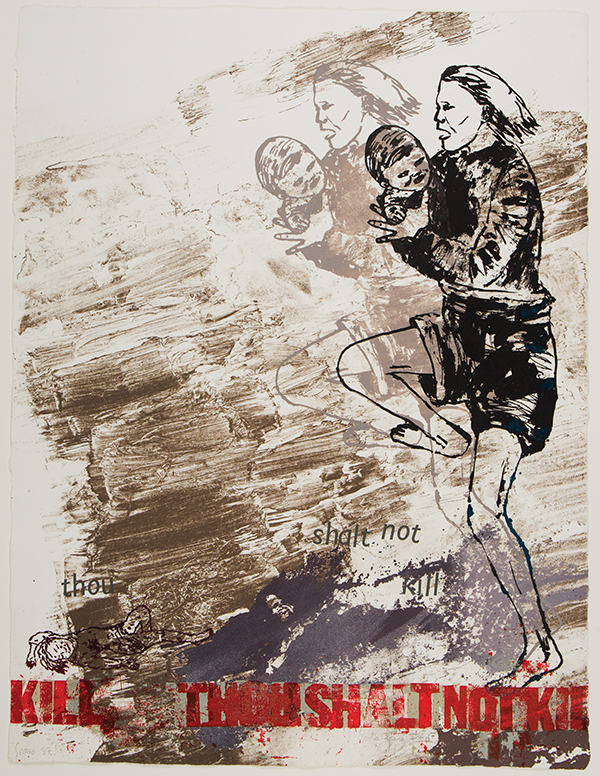Love Carved in Stone
Lesson Five

Lesson Five — Words of Love: Don’t Kill Each Other
The Sixth Word
Primary Scripture: Exodus 20:13, and Matthew 5:21-26
No murder: A Checklist
This lesson on murder may be difficult for your group because there are implications for social issues about which you may disagree. War. Abortion. Death Penalty. You will not solve these issues, or convince anyone of the rightness of your position, in the brief time your study group will meet. My prayer is that you will not let hot button issues distract you from a deeper personal examination
Most of us have not literally killed anyone, although some of us may have done so in an accident or in a time of war or in protection of ourselves or our families. Still, most of us are not murders, right? In times of fear, anger, stress, or aggression most of us have found ways to harness our murderous instincts and live relatively peaceably in our worlds. Haven’t we?
The ancient ones understood that murder happens in a lot of ways. Our Biblical ancestors realized quickly that murder is not simply a biological concept. It is perfectly possible to murder a person without inflicting physical harm at all. Of course, we are not to slay others or ourselves, but in the beloved community neither do we destroy or damage another’s spirt, will, reputation, or hope for the future. These ways to murder have long lasting repercussions that cannot easily be turned around. By way of illustration I’ll tell you two stories from my own life. One is seemingly insignificant. The other, after many years of healing, still fills me with a sense of shame.
First, when I was in about the fourth or fifth grade, we started studying new math. I wasn’t a math person to begin with and this new way of looking at things was confusing but it was also exciting. One day the teacher explained a concept and then asked the class for questions. Several of us raised our hands. The teacher came to me and said, “Genie, don’t worry. You’re a girl. You don’t have to be good at math. I need to help Chuck instead.” I. Kid. You. Not. In that unthinking remark, the spark of excitement I had felt about learning something new died. My belief in myself as able to learn it died too. It was a small thing, maybe but it was a thing.
The second story is harder to tell. When my previous marriage was disintegrating, I felt that somehow it was all my fault, that I was not pretty enough, or conscientious enough, or careful enough, or just plain enough enough. I felt like I was walking on egg shells waiting for the next wound to land. One day as I passed through our bedroom while my former husband was preparing for work, he grabbed my arm, whirled me around and said, “You look like a sheepdog from behind. You disgust me.” I remember that vividly and yet it was nearly 30 years ago. That comment just killed me; I died a bit in that moment. After all the grace and healing of the intervening years, I still sometimes catch myself backing out of a room so no one will see me from behind. Killing words land deeply.
God wants us to understand that in the community formed of God’s love, we are not to wound, damage, or destroy the self-esteem, the prospects, the hopes and dreams of ourselves and our neighbors. All of that is murder. The following list contains items that have appeared in the literature about this Word over centuries. Please take a bit of time to quietly reflect on what you read. Ask yourself how each of these things kills.
- Gossip and undue criticism
- Cultural stereotypes and appropriation
- Prejudice in any form, white supremacy, xenophobia, and deflecting from those things by claiming reverse discrimination
- Blaming others for our problems, the ‘them-ing’ of our problems
- Harboring resentment and unforgiveness
- Keeping silent in the presence of social injustice
- Social policy that benefits some and is blind to others
- Building wealth from investing in companies that exploit
- Taking care of people to meet our own needs to the extent that the people we care for do not grow and mature and take responsibility for their own lives
- Degrading language, images, actions, or silence in the presence of such things
According to the standards of the 10 Words, all of these things are murder. Murder most foul. It is humbling to consider how we murder and crucial for the beloved community to grasp that we do.
Eugenia Anne Gamble
Author of the 2019–2020 PW/Horizons Bible Study
******
Purchase a Love Carved in Stone Bible study book (item number HZN19100) and study along with us.
Call 800/533-4371 or order online
